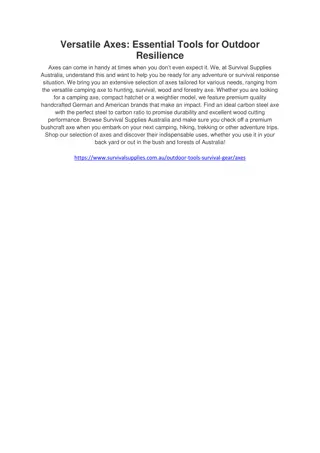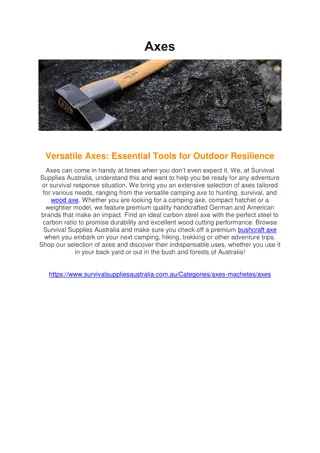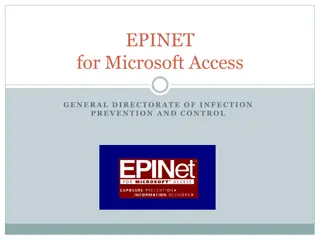HANDY HINTS
Learn about the latest updates on rent increase regulations, including the freeze period due to Covid-19, notice requirements, and changes in asset depreciation limits. Stay informed to ensure compliance with current laws and maximized benefits for landlords.
Download Presentation

Please find below an Image/Link to download the presentation.
The content on the website is provided AS IS for your information and personal use only. It may not be sold, licensed, or shared on other websites without obtaining consent from the author.If you encounter any issues during the download, it is possible that the publisher has removed the file from their server.
You are allowed to download the files provided on this website for personal or commercial use, subject to the condition that they are used lawfully. All files are the property of their respective owners.
The content on the website is provided AS IS for your information and personal use only. It may not be sold, licensed, or shared on other websites without obtaining consent from the author.
E N D
Presentation Transcript
Napier HANDY HINTS July 2020 Written by Sharon Cullwick (NZPIF Executive Officer)
2020 NZPIF AGM and Communications Meeting Date is confirmed as Saturday 17thOctober at the Brentwood Hotel in Wellington. NZPIF will pay for one person to attend however each Association is able to send more representatives. AGM this will be included that day.
Education Programme This has been launched Free to members $300 for non members On line Self Managing Landlords Course Details can be found on NZPIF.org.nz Enrol and then you will be sent a date you can start the course.
Asset Depreciation Before 16thMarch 2020 - you could claim an immediate tax deduction for assets costing less than $500, instead of claiming depreciation over the following years. This has temporarily increased from17th March until 16 March 2021. Limit is now $5,000. (you can pool assets together). After 17thMarch 2021 it will go back to $1,000. Please check with your accountant and on the IRD web site.
Covid 19 Urgent Legislation Rent price increase freeze this is still in place until September 26th2020, however you can now send letters increasing the rent after this date. Termination Notices this is still in place until 26thJune. Tenancy Tribunal have the ability to have hearings with no one present they will be basing them off paper so make sure your applications are thorough and include everything. (this is to help TT catch up)
Important information on rent increases Rent increase notices can be given now provided the increase takes effect after the six-month freeze period (after 25 September 2020, unless the legislation is extended).
Giving notice to increase the rent: A landlord must give their tenant at least 60 days written notice of a rent increase. Boarding house landlords must give their tenant at least 28 days written notice. The notice must be served in writing, say how much the rent is increasing by and the day the increased rent is due. The landlord should keep a copy of the notice.
Points to remember on rent increases Landlords can only increase rent after the first 180 days of the tenancy provided the increase is not within 180 days of the last increase. Landlords can only increase rent for fixed-term tenancies if the tenancy agreement allows this. Special rules apply if a tenancy agreement is subject to an annual rent increase process
Healthy Homes important dates From 1 July 2020 Now changed to 1 December 2020 Landlords must include a statement of their current level of compliance with the healthy homes standards in any new, varied or renewed tenancy agreement. From 1 July 2021 Private landlords must ensure their rental properties comply with the healthy homes standards within 90 days of any new, or renewed, tenancy. All boarding houses (except K inga Ora (formerly Housing New Zealand) and Community Housing Provider boarding house tenancies) must comply with the healthy homes standards. From 1 July 2023 All K inga Ora (formerly Housing New Zealand) houses and registered Community Housing Provider houses must comply with the healthy homes standards. From 1 July 2024 All rental homes must comply with the healthy homes standards
Progress of the RTA Amendment Bill: 17thFebruary 2020 - Residential Tenancies Amendment Bill introduced to Parliament. 20thFebruary 2020 - Bill passed the first Reading 25thMarch 2020 - Submissions were heard over lock down by the Social Services and Community Committee. 7thJuly 2020 Select Committee reported back. (was supposed to be due 22ndJune) July August 2020 Second Reading no date is set for this July August 2020 - Committee of Whole House July August 2020 - Third Reading If approved receives Royal Assent (Becomes law 6 months later)
The Select Committee Report can be found here : https://www.hud.govt.nz/news-and- resources/news/residential-tenancies- amendment-bill-select-committee-report- back/
Select Committee recommended: Making minor amendments to clarify and optimise some termination grounds, fibre exemptions, rent setting provisions, and enforcement provisions. Expanding the termination ground relating to using the premises for occupation of employees to include contractors, and adding a new provision to enable use of this ground where the landlord is the Ministry of Education and the employer is a Board of Trustees. Clarifying that where a tenant challenges a notice of anti- social behaviour in the Tenancy Tribunal, the landlord bears the burden of proof.
Select Committee recommended (continued) Narrowing the family portion of the associated person test to only include spouses and partners. Providing automatic name suppression where the Regulator takes a case on behalf of a party. Including a new obligation for landlords to respond to assignment requests in writing within a reasonable period of time. Clarifying that premises used to provide government- funded transitional and emergency housing are exempt from the Act, to address the uncertainty in the sector.
55a Termination grounds for anti social behaviour (1) A landlord under a periodic tenancy may apply to the Tribunal for an order terminating the tenancy on the ground of anti-social behaviour. (2) The Tribunal must (subject to subsection (3)) make the order if satisfied that (a) on 3 separate occasions within a 90-day period the tenant, or a person in the premises with the tenant s permission (other than the landlord or a person acting on the landlord s behalf or with the landlord s authority), engaged in anti-social behaviour in connection with the tenancy; and
55a Termination grounds for anti social behaviour (continued) (b) on each occasion the landlord gave the tenant written notice (i) describing clearly which specific behaviour was considered to be anti-social and (if known to the landlord) who engaged in it; and (ii) advising the tenant of the date, approximate time, and location of the behaviour; and (iii) stating how many other notices (if any) the landlord has given the tenant under this paragraph in connection with the same tenancy and the same 90-day period; and
55a Termination grounds for anti social behaviour (continued) (iv) advising the tenant of the tenant s right to make an application to the Tribunal challenging the notice (see sections 77(1) and 78(1)(a) regarding the Tribunal); and (c) the landlord s application to the Tribunal was made within 28 days after the landlord gave the third notice.
55a Termination grounds for anti social behaviour (continued) 3) However, the Tribunal must not make the order if satisfied that (a) doing so would be unfair because of the circumstances in which the behaviour occurred or the notices were given; or (b) in making the application, the landlord was motivated wholly or partly by the exercise or proposed exercise by the tenant of any right, power, authority, or remedy conferred on the tenant by the tenancy agreement or by this or any other Act or any complaint by the tenant against the landlord relating to the tenancy (unless the Tribunal is satisfied that the purported exercise or the complaint was or would be vexatious or frivolous to such an extent that the landlord was justified in making the application).
55a Termination grounds for anti social behaviour (continued) (4) In deciding whether to make an order under subsection (2), the Tribunal must not take into account the impact that terminating the tenancy would have on the tenant. (5) In subsection (2)(a), if a tenant is in the premises at the same time as another person (other than the landlord or a person acting on the landlord s behalf or with the landlord s authority), the tenant is presumed to have permitted the person to be in the premises unless the tenant proves that they took all reasonable steps to prevent the person from entering the premises or to eject the person from the premises.
55a Termination grounds for anti social behaviour (continued) (5A) If a tenant makes an application to the Tribunal challenging a notice given under subsection (2)(b), it is for the landlord to prove that anti-social behaviour was engaged in as described in subsection (2)(a) and that the notice met the requirements of subsection (2)(b). (6) In this section, anti-social behaviour means (a) harassment; or (b) any other act or omission (whether intentional or not), if the act or omission reasonably causes alarm, distress, or nuisance that is more than minor.
55BTermination where it would be unreasonable to require landlord to continue with tenancy (1) A landlord under a periodic tenancy may apply to the Tribunal for an order terminating the tenancy on the ground of hardship. (2) The Tribunal may make the order only if satisfied that (a) without the order the landlord would suffer greater hardship than the tenant; and (b) because of that hardship, it would be unreasonable to require the landlord to continue with the tenancy. (3) In deciding whether it would be unreasonable to require the landlord to continue with the tenancy, the Tribunal must take into account the impact that terminating the tenancy would have on the tenant. (4) Any order under this section must specify a date for the termination.
How can we try and stop this: Please talk to your local MP s, local media, councils, business owners, friends and family Use social media to let your friends know how the RTA changes can impact them directly. The more discussion we have, the more notice the Government will take on this matter. Ask any property owner to join their local Association or Associate membership to help us in our fight to stop these changes. Write letters to everyone who will listen www.nzpif.org.nz
New Bond Forms Tenancy Services have updated their bond forms. Ensure you are using the latest version for faster processing. Tenant email is no longer mandatory. Additional forms can now be attached to the one Bond Lodgement form.
Rent Arrears Assistance Housing Support Product This is a product to help tenants stay in their homes due to losing their jobs or reduced working hours Tenants should contact Ministry of Social Development. Available from 6thJuly 2020. Tenants need to prove hardship and they will be asset tested. Can help with overdue rent payments. Tenants can get up to $4000 in the next 12 month period.
Napier Thank you























